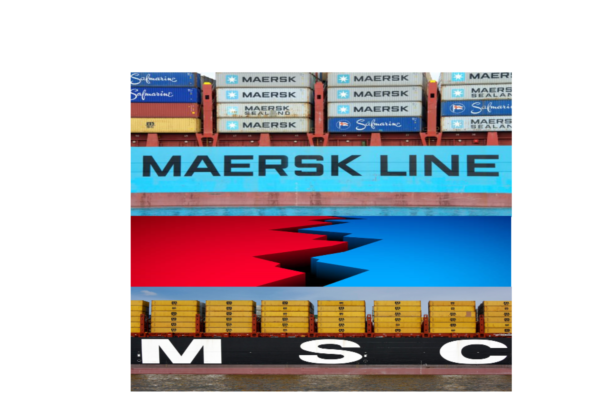A.P. Moller-Maersk A/S (Maersk) and Mediterranean Shipping Co. (MSC), the world’s two largest container lines, are ending an eight-year vessel-sharing agreement as the fierce shipping rivalry in global logistics intensifies. They have agreed not to renew their alliance in 2025. The question is whether the breakup will benefit the shipping community, with the two giants offering competitive pricing to customers?
The pooling arrangement, known as the ‘2M alliance’ that the companies formed in 2015, will stop in two years so the two can “pursue their individual strategies,” according to a joint statement from Maersk and MSC. Together they have controlled almost two-thirds of the world’s container capacity, giving the 2M alliance the ability to offer customers more frequent departures than a single shipping line would do.
The 2M partnership has enabled the two shipping lines to divert customers’ cargo to each other’s vessels — akin to code-sharing deals between airlines. They formed the alliance to cut costs at a time when the industry was plagued by an overcapacity of vessels.
Discussions to form the 2M began in 2014, ahead of its 2015 launch. At the time, container shipping was supersizing itself with the introduction of ultra-large containerships. The thinking was that operating in this way would reduce costs. But 10 years is a long time in shipping, and both container line operators have shifted their ambitions.
The termination comes on the back of MSC’s massive fleet expansion over the past two years – by the end of 2024, MSC is expected to have a total capacity approximately equal to that of MSC and Maersk combined when the two carriers formed the alliance in 2015.
Maersk and MSC are clearly pursuing different strategies. MSC has been rapidly acquiring container capacity, while Maersk has focused on its vertical integration strategy and has not sought to defend its number one rank in terms of TEU (20-ft Equivalent Units).
Maersk is believed to lack sufficient vessel capacity to resume the services on its own and plans to unify its structure by integrating its brands such as Hamburg Süd and Sealand, among others. Maersk completed the acquisition of Hamburg Süd in 2017 and the duo created a combined fleet of 743 container vessels at the time. It now says its intention is “to retire all acquired brands.” Others that are likely to be affected are Twill, Senator, LF Logistics, and Martin Bencher.
However, it confirmed that “non-integrated brands”, such as its towage specialist, Svitzer – which has been in the news recently due to staff lock-outs – and its terminal business, APM Terminals, “follow a different business model” and therefore “will continue to operate under their existing brand names”.
Now that container volumes are falling, it remains to be seen whether shippers will reap any benefits in terms of lower freight rates as a result of the break-up.
Colless Young has well-established relationships with all the major container lines and offers you professional advice on your international shipping requirements. As licensed Customs Brokers and International Freight Forwarders, we provide a complete range of logistics services, both air and sea cargo, through all Australian ports and airports. We handle imports, exports, trucking, warehousing and fumigation treatment.

